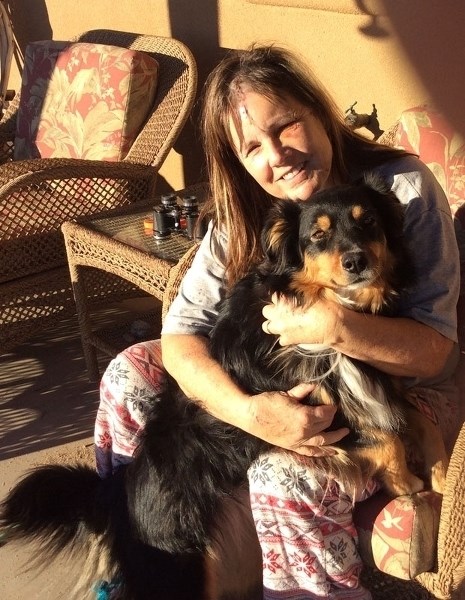A Calahoo rodeo rider is safe at home this week after her dog saved her from what could have been a fatal horse-riding accident.
Tracy Matkea of Calahoo was released from an Arizona hospital earlier this week after being treated for life-threatening injuries sustained while horseback riding.
"I've got just over 100 stitches and staples," she says, speaking by phone and email from her winter home near Wickenburg, Ariz.
"I'm pretty banged up!"
A retired teacher, Matkea has been active on the Canadian rodeo circuit for decades and trains horses for barrel racing. She and her husband Butch are working with three horses and regularly ride them amongst the rocks and saguaro cacti in the desert outside their home.
On the morning of Jan. 10, Matkea said she headed out on a test ride with a young horse down a dry riverbed about 500 yards from her home – a route she had used many times before. She was accompanied by her dog, Becky-Jo, a three-year-old Australian shepherd/border collie cross.
Matkea says Becky-Jo follows her on all her rides, often running five to eight miles three times a day.
"She lives for this!"
At some point during the ride, Matkea believes the horse somehow got spooked and threw her from the saddle.
"I have absolutely zero recollection of the entire event. I don't even remember saddling the horse."
Judging from the blood and the marks she left at the accident site, Matkea believes the horse dragged her for some distance before it returned to the family home.
Butch says he saw the rider-less horse later while working in the yard and immediately knew something was wrong. Becky-Jo arrived soon after, and kept circling around the driveway barking at him to follow.
He and a neighbour hopped onto some ATVs and followed the dog to a spot about three miles away.
"I just kept following her, and she brought me right to where Tracy was," he says.
"She was kind of laying in the rocks there, bleeding very badly."
Matkea says she was airlifted to a hospital in Phoenix where she was treated for severe facial and scalp lacerations, a severed head artery, a broken orbital bone (located around the eye), and a major concussion.
"The doctors explained to my husband that 10 more minutes of blood loss (and) I would not have survived."
She was released from hospital two days later and is now recovering at home. She's still in a lot of pain and has a large number of bruises.
Matkea says she adopted Becky-Jo and her sister, Miss Kaye, on a whim when she saw them in a Tupperware bucket in a feed store in Arizona. She describes the dog as shy, smart, and very protective of her owners.
"I keep telling her she's a hero."
Matkea says she always knew Becky-Jo was a smart dog, and that she's turned out to be more amazing than she ever would have thought.
"She's definitely earned her keep forever."
Safety lessons
Matkea says this is the worst she's ever been injured while horseback riding, although she has had concussions from previous rides. She was not wearing a helmet during the accident, but would likely start doing so now.
While Ontario requires anyone under 18 to wear a helmet while on a horse, Alberta does not.
Head injuries are unfortunately pretty common amongst horse riders, says Sturgeon County's Sonya Steiner, who requires all riders at her Horse Sense Training and Petting Zoo to wear certified equestrian helmets.
"Horses are prey animals so they can spook very easily," she says, and the head injuries you can get as a result can be severe.
Alberta Agriculture notes that head injuries are the most common reason for horse-related hospital admissions, with horseback riding generating more injuries per hour than downhill ski racing, football, hang-gliding, or motorcycling. Research suggests that wearing a certified equestrian helmet can reduce your risk of horse-related death by up to 80 per cent.
Helmets are cheap and comfortable insurance against these injuries, Steiner says.
"Always wear a helmet."




